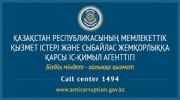- Departments by region
- Astana
- Almaty
- Ulytau Region
- Zhetysu Region
- Шымкент
- Abay region
- Akmola region
- Aktobe region
- Almaty region
- Atyrau region
- East Kazakhstan region
- Zhambyl region
- West Kazakhstan region
- Karagandy region
- Kostanay region
- Kyzylorda region
- Mangistau region
- Pavlodar region
- North Kazakhstan region
- South Kazakhstan region
Date of publication: 17.01.2024 17:12
Date of changing: 17.01.2024 17:15
The Head of State, President Kassym-Jomart Tokayev signed amendments to the Tax Code, which will enter into force on January 1, 2024.
Thus, the Tax Code has been supplemented with a new Article 51-2, which defines the procedure and conditions for granting deferral on payment of state duty in courts.
The change in the deadlines for the payment of the state fee is carried out in the form of a delay in the payment of the state fee when the court issues a ruling on the delay in the payment of the state fee.
Deferral of payment of state duty in courts is a change in the deadline for payment of state duty, based on the property status of an individual or the financial situation of a legal entity, with the exception of a large business entity.
The deferral is granted for a period not exceeding one year from the date of the court's ruling on the deferral of payment of the state fee.
In this case, an individual or legal entity has the right to pay the amount of the state fee partially or ahead of schedule before the end of the deferral period.
It is also provided that a deferral may be granted to an individual based on his property status, or to a legal entity, with the exception of a large business entity, based on a financial situation that does not allow paying the state fee when filing a claim, however, there are sufficient grounds to believe that the possibility of its payment will arise during the period for which it is provided postponement in the presence of one of the following reasons:
1) causing damage as a result of a natural disaster, technological disaster;
2) late payment of wages to an individual;
3) registration as an unemployed person;
4) the presence of a serious illness of an individual and being treated for more than three months;
5) non-payment of money to a legal entity for the delivered goods, work performed, services rendered by them;
6) the seasonal nature of the production and (or) sale of goods, works or services by a legal entity;
7) provision of targeted social assistance.
After making a ruling on deferral of payment of the state fee, the courts send to the tax authorities at the place of consideration of cases a copy of the ruling on deferral of payment of the state fee.




























